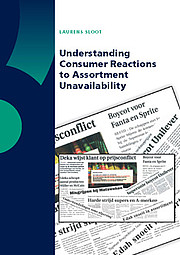Understanding Consumer Reactions to Assortment Unavailability Defended on Thursday, 16 February 2006
Any regular grocery shopper will be familiar with the annoying situation in which his or her preferred product is not available at the moment (s) he wants to buy it. Assortment unavailability can be temporary (e.g., out-of-stock) or permanent in nature (e.g., assortment reduction). Shopper research shows that the unavailability of products is one of the most significant annoyances for grocery shoppers. This dissertation presents three empirical studies that research consumer reactions to out-of-stock and assortment reduction. Both out-of-stock and assortment reduction lead to consumer complaining behavior, category sales losses and store switching behavior. It is found that consumer reactions to assortment unavailability are mainly related to brand- and product-related antecedents of the item that is not available. Furthermore, the long-term impact of an assortment reduction on category sales differs from the short-term impact. In summary, this dissertation concludes that retailers should be very careful reducing assortments and boycotting brands.
Keywords
Retailing, assortment management, category management, assortment reduction, brand boycott, brand delisting, out-of-stock, brand equity, hedonic and utilitarian products







